Arto's Blog
Good bye bicycles, we'll go sailing!
Posted: 2015-02-27 19:31:00, Categories: Travel, Hospitality exchange, Hitchhiking, Chile, Argentina, 715 words (permalink)
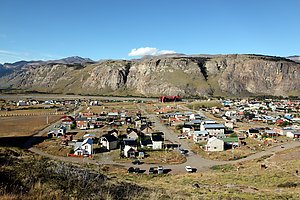 In El Chalten, Argentina we stayed at a kind of cyclists' camp.
It was a small house at the edge of the town belonging to Florencia, a
local woman who welcomed all touring cyclists to camp in her garden
against a voluntary donation to cover electricity, gas and water
costs. As it was high season, the place was packed with guests.
Sharing one bathroom with more than twenty others required some
patience, but it was a great place to meet other cyclists on shorter
and longer tours, most travelling south but some north as well.
In El Chalten, Argentina we stayed at a kind of cyclists' camp.
It was a small house at the edge of the town belonging to Florencia, a
local woman who welcomed all touring cyclists to camp in her garden
against a voluntary donation to cover electricity, gas and water
costs. As it was high season, the place was packed with guests.
Sharing one bathroom with more than twenty others required some
patience, but it was a great place to meet other cyclists on shorter
and longer tours, most travelling south but some north as well.
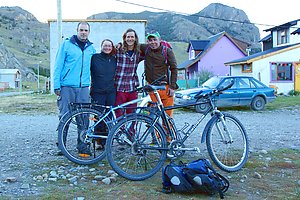 Our time was slowly running out so we asked Florencia if she'd know
someone who would be interested in buying our bicycles. It didn't take
long before a friend of her appeared and was interested in mine. We
said that we'd like to sell both at the same time, the word passed
around and soon came another man who was looking for a bike for his girlfriend. We
asked for a reasonable price and both bikes were sold. Next day,
before the new owners came to pay and collect the bikes, we would have
even had a second buyer for both. We learned that it is difficult in
Argentina to get quality bikes and the prices are higher than in
Europe. There was more interest than we had expected and we ended up
even selling two of our panniers and one of the front bags. A big
change in our trip and faster than we had thought! However, we had
known that we would have to get rid of the bikes sooner or later and
had bought them second hand specially for this tour. After selling
them, we felt slighly sad but relieved that there was one thing less
to think about.
Our time was slowly running out so we asked Florencia if she'd know
someone who would be interested in buying our bicycles. It didn't take
long before a friend of her appeared and was interested in mine. We
said that we'd like to sell both at the same time, the word passed
around and soon came another man who was looking for a bike for his girlfriend. We
asked for a reasonable price and both bikes were sold. Next day,
before the new owners came to pay and collect the bikes, we would have
even had a second buyer for both. We learned that it is difficult in
Argentina to get quality bikes and the prices are higher than in
Europe. There was more interest than we had expected and we ended up
even selling two of our panniers and one of the front bags. A big
change in our trip and faster than we had thought! However, we had
known that we would have to get rid of the bikes sooner or later and
had bought them second hand specially for this tour. After selling
them, we felt slighly sad but relieved that there was one thing less
to think about.
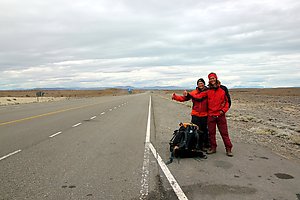 Our next goal was to arrive in Ushuaia, the southernmost city in
Argentina about 1000 kilometers further south mostly through the treeless
pampa. In between we had to still pick up a package containing some
winter clothes from Puerto Natales in Chile. It would have been
possible to travel by bus, but we had still over a week of time and
decided to try hitchhiking. When travelling on the Carretera Austral,
we had often seen hitchhikers by the roadside and without bicycles it
was now easier for us too.
Our next goal was to arrive in Ushuaia, the southernmost city in
Argentina about 1000 kilometers further south mostly through the treeless
pampa. In between we had to still pick up a package containing some
winter clothes from Puerto Natales in Chile. It would have been
possible to travel by bus, but we had still over a week of time and
decided to try hitchhiking. When travelling on the Carretera Austral,
we had often seen hitchhikers by the roadside and without bicycles it
was now easier for us too.
The way of the thumb worked well. Every time nice people picked us up, we got to practise our Spanish and enjoyed a lot of mate tea as almost in every car the traditional cup of mate was passing around between the passengers. We made our way to Puerto Natales in one day, probably faster than it would have been by bus. There we stayed a couple of days with a CouchSurfing family before continuing forwards. To get out of Puerto Natales was a bit more difficult, but after a couple of hours waiting and walking we got a ride near Punta Arenas, where we camped by the seaside. Next day, the first car picked us up and we only had to change once for a ride directly to Ushuaia. Not only did we get there in time but had also local contacts in the city to spend some time with, perfect. Through a recommendation of another traveller we met in Puerto Natales, we also found a very friendly family from which we rented a room for our last few days in Argentina.
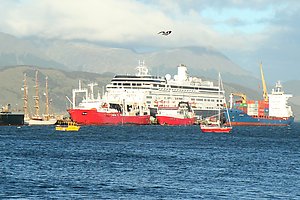 Soon after posting this, our next big adventure will begin. Tonight we
will board the sailing ship Bark Europa for a 52 day sailing journey
to Antarctica, South Georgia, Tristan da Cunha and South Africa.
During that time we won't be able to post anything in the blog nor
read our emails, and naturally our mobile phones won't work either on
the seas. For me, it'll be the longest time without Internet since I
started using it 20 years ago. Probably hard, but I'm sure I will
survive. :-) It is however possible to follow the progress of the
journey via Internet on the Bark
Europa homepage. The position of the ship will be regularly updated on the world
map and occasionally also logbook entries will be transmitted on the
site via a satellite connection. We will write next time in about two
months after we've arrived in South Africa.
Soon after posting this, our next big adventure will begin. Tonight we
will board the sailing ship Bark Europa for a 52 day sailing journey
to Antarctica, South Georgia, Tristan da Cunha and South Africa.
During that time we won't be able to post anything in the blog nor
read our emails, and naturally our mobile phones won't work either on
the seas. For me, it'll be the longest time without Internet since I
started using it 20 years ago. Probably hard, but I'm sure I will
survive. :-) It is however possible to follow the progress of the
journey via Internet on the Bark
Europa homepage. The position of the ship will be regularly updated on the world
map and occasionally also logbook entries will be transmitted on the
site via a satellite connection. We will write next time in about two
months after we've arrived in South Africa.
Learning Ukrainian and practising Japanese
Posted: 2008-09-25 23:34:42, Categories: Travel, Ukraine, Hitchhiking, 980 words (permalink)
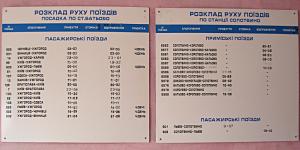 Trying to communicate in foreign languages or without any common
language is often challenging but also one the most fun tasks when
traveling. In Eastern Europe, the majority of countries have their own languages
and Russian is the most widely spoken second one. Unfortunately I
don't understand any of them much. In cities it's common to find
someone who can speak English, and for all the other situations I carry a
phrasebook and try to learn at least a few words in each local language.
Drawing pictures and smiling is also always a good option.
Trying to communicate in foreign languages or without any common
language is often challenging but also one the most fun tasks when
traveling. In Eastern Europe, the majority of countries have their own languages
and Russian is the most widely spoken second one. Unfortunately I
don't understand any of them much. In cities it's common to find
someone who can speak English, and for all the other situations I carry a
phrasebook and try to learn at least a few words in each local language.
Drawing pictures and smiling is also always a good option.
Ukraine offered a pleasant surprise: the language I ended up using the most during my three day visit was Japanese. Besides that, I had plenty of opportunities to practise my few words of Russian and non-verbal communication skills as well. Lonely Planet had decided to include neither Ukrainian nor Russian in the Eastern Europe phrasebook, so there was room for improvisation.
After the Rainbow Gathering in Serbia I spent two days in Belgrade and a week in Romania, mainly meeting friends in Timisoara. From there I took a train north to Baia Mare, hitchhiked 70 km further to Sighetu Marmatiei and walked across the border to Ukraine. Border crossing was easier than expected. I had to fill in an immigration card and hand over my passport to get a stamp, but that was it. All done in 15 minutes, including 10 minutes of waiting in the queue.
Solotvyno didn't seem to be a very popular destination for foreigners except Romanians coming across the border for shopping. People were looking at me curiously and a few confirmed what they saw by asking "Turist?". Modern development had embraced the town with an ATM which accepted my credit card and spit out a bunch of hryvnias. Then I spotted railway tracks and followed them to find the town railway station.
I had minor difficulties deciphering the timetable (in the picture) but the station personnel were happy to help. When my understanding of both Ukrainian and Russian turned out to be limited they even wrote the same information in my notebook using beautiful cyrillic handwriting. After a bit of head-scratching I figured out that I was lucky. The train standing in front of the station would leave in two hours and arrive early next morning in Lviv, where I wanted to go. I went to grab some snacks for the trip in the town center and then tried to buy a ticket. "Katastrof, nema electricitet, nema computer" sounded like it could be a problem but fortunately it wasn't. I was advised to simply get onboard and the conductor would issue me a ticket in the train.
The 15 hour, 400 km journey cost less that 3 euros, so I probably got the cheapest or at least almost cheapest available ticket. The "platskartny" wagon was similar to sleeper class in India: open layout featuring basic beds which doubled as seats, no bedsheets. There was a bit more space than in Indian trains and the added luxury of a table between each two lower beds. On the other hand, the Ukrainian train didn't have any fans so it became quite hot inside.
My travel companions couldn't really understand why someone who had zero ability in Ukrainian and very limited skills in Russian would like to go to Lviv. They helpfully advised me that I could change the train near the Polish border and go directly to Warsaw if I wanted. Nevertheless, I stayed in my decision about visiting Lviv and announced that I wanted to learn some Ukrainian before arriving there. Using Russian and Polish I got translations to "Hello", "Thank you", "My name is Arto" and "Where is the toilet" in the local language, and drawing pictures helped to pick up a few more words such as train, car, bicycle, big and small. A ten year old girl was the most enthusiastic instructor and started teaching me the names of all objects which we could find around us. So I also learned how to say table, window and curtain in Ukrainian.
In the beginning the train was half empty but eventually there were almost twice as many passengers compared to the number of beds. The Ukrainians solved the problem by drinking enough beer and making noise until it didn't really matter how comfortable place they had for sleeping. I managed to get some sleep despite drinking only a little. Completely refusing the offered drinks would have been difficult and probably impolite. Luckily they didn't have any vodka. ;)
In Lviv I walked to a youth hostel which had been recommended to me by a CouchSurfing contact who was away and couldn't host himself. In the hostel I met Taka, a Japanese guy who already knew Polish and Russian and was staying in Ukraine to learn one more language. He spoke English too, of course, but was happy to find someone who could communicate in his own language. Taka offered to show me the city so I got a companion and guide for the weekend. We walked around, visited a couple of museums and had dinner in Криївка. It was a funny hidden restaurant which didn't have any kind of sign at the entrance but was full of people already early in the evening.
From Lviv I took a bus to Warsaw, queueing 4 hours at the border to get out of Ukraine, and continued by another bus to Lithuania. In Joniškis I spent a few nice days with my friend Dalia and her family before returning to Helsinki via Riga and Tallinn. I've been back home for a week and a half now. Compared to Ukraine, the temperature in Joniškis and in Finland was about 15 degrees lower and I got a flu. It already seems like a tradition when coming back from a longer trip in warm countries. Perhaps I'll learn some day how to avoid it.
Five friends in the Buba
Posted: 2008-08-28 21:32:28, Categories: Travel, Bosnia, Montenegro, Serbia, Hitchhiking, 728 words (permalink)
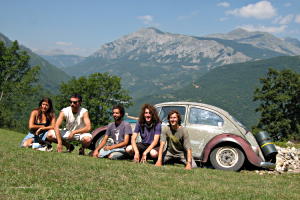 I left Zelenkovac sharing a ride with Gareth, David, Thibault and Maria in Gareth's model 1966 VW Beetle, which we started calling as the Buba. It was a small challenge to pack in five people and all the luggage including three tents, but eventually we managed to make it even quite comfortable. Gareth had put the Buba together using parts from several different cars without adding a new layer of paint so the old machine looked like it could fall apart any time.
I left Zelenkovac sharing a ride with Gareth, David, Thibault and Maria in Gareth's model 1966 VW Beetle, which we started calling as the Buba. It was a small challenge to pack in five people and all the luggage including three tents, but eventually we managed to make it even quite comfortable. Gareth had put the Buba together using parts from several different cars without adding a new layer of paint so the old machine looked like it could fall apart any time.
Watching locals' reactions was fun. People would wave happily with a broad smile on their face or just stare at us. David would wave back from the left front seat with both hands, which produced an additional shock as many thought he was taking hands off the steering wheel. The Buba was a British model so the driver was of course sitting on the right.
The police stopped us several times to see car papers. They complained about not seeing the license plate because it was under the spare tire we had tied with rope in the back. We fixed the problem by making a new plate using a piece of cardboard and attaching it on top of the tire. Recently expired green card was a slightly bigger problem. David's Serbian language skills saved us three times, but finally at the border they wouldn't let us through without corruption money or being stuck for long time waiting to pay a fine. Generally also the police was mostly amused of the whole sight of five people in the small car. One of them looked at us while browsing the papers and commented: "Oh, it looks like you have already enough problems with the heat :)"
We drove to Visoko near Sarajevo, where a couple of hills had recently been identified as possible ancient pyramids. For a non-archaeologist it was difficult to say from a few patches of stone wall exposed from vegetation. To be fair, we only visited the so called Sun pyramid, and some people said there would have been a bit more to see at the Moon pyramid. Three of us had already been to Sarajevo so we decided to skip the city and continued South-East to Montenegro instead. The Buba carried us through the beautiful canyon of the Piva river and further up the mountains to the Durmitor national park. For accommodation we always simply looked for empty fields where grass had been cut and set up our tents, asking locals for permission if we saw anybody nearby.
Shortly after Durmitor we left the car in Bijelo Polje near Serbian border because we wanted to go to Guča and insurance for Serbia would have been too expensive. Gareth, Thibault and Maria took the train, I hitchhiked with David. We won the race by one and a half hours and made a new friend with Slobodan, a Serbian van driver on his way back home to Belgrade.
Guča trumpet festival was a funny experience. Dozens of brass bands came to play in the small town of 2000 inhabitants which was completely taken over by half a million partying visitors. Five days of music and dancing powered by beer, rakia, grilled meat and more beer. Souvenir stands were offering small horns, cds, other Guča memorabilia and Serbian nationalistic T-shirts featuring pictures of Karadzic. I had less beer preferring instead to cook vegetarian food and sip sangria with a group of three Germans, two Italians and a Swedish girl who were camping next to my tent.
Friday and Saturday evenings featured the biggest concerts on the stadium, but I liked Thursday night best. On Thursday the bands were on the streets playing simultaneously over each other with bars blasting Serbian turbofolk from loudspeakers to the mix, creating a chaotic but happy atmosphere. There were already many people but still a bit more space to move than during the weekend. Overall, Guča was certainly worth seeing even for someone who is not specially a brass music fan, but perhaps it was enough to experience it only once.
Guča was the last place where out group of five friends was together. Gareth returned to Montenegro to pick up the Buba and continue towards Albania, Thibault and Maria took their own ways, while I and David headed to Eastern Serbia to the European Rainbow Gathering.
Slow life in Bosnian villages
Posted: 2008-08-07 21:21:50, Categories: Travel, Ecology, Bosnia, Hitchhiking, 808 words (permalink)
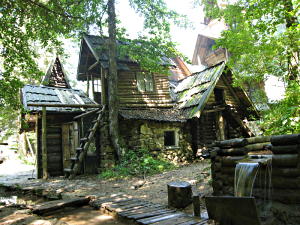 During one week I got an introduction to life in Bosnian countryside by visiting a couple of villages and the ecological community Zelenkovac. Work on the fields was more modernized than for example in Romania, but far from large high tech farms in Western Europe. People had time, nearly everybody smoked cigarettes constantly and guests were received by offering them shots of homemade rakia, a strong alcohol usually made of plums.
During one week I got an introduction to life in Bosnian countryside by visiting a couple of villages and the ecological community Zelenkovac. Work on the fields was more modernized than for example in Romania, but far from large high tech farms in Western Europe. People had time, nearly everybody smoked cigarettes constantly and guests were received by offering them shots of homemade rakia, a strong alcohol usually made of plums.
In Zagreb, Croatia, I took a train to Karlovac and started hitchhiking from there towards the Bosnian border. A man who built swimming pools for a living took me to the crossroads near Plitvice and a truck driver picked me up from there. It was my first ride ever in a large truck — cool to see the road from high up in the cabin. At the customs the truck had to stop and wait in line. I hopped off, crossed the border by foot and decided to walk to the first village, Izacic, and see what happens.
Hasan was sitting on the terrace of his house and waved me to have a seat beside him and take break. Soon his English speaking son Adis arrived and it didn't take long until I had met some of his friends and been invited to stay overnight. In fact I ended up staying two nights.
Life was slow, especially for the young people who were on holidays from school or university. They killed time sitting outside, smoking, sipping some coffee or beer, chatting and playing with their mobile phones. Inside they had TVs and Playstations but Internet was not common yet. Actually there was an Internet cafe in the village but the connection was broken. Nearest town was Bihac, where we had a picnic by the Una river. Quite a few people had friends or family members who were working in Austria or Germany. They came back in their home villages in the summer to hang around and show off their cars.
From Izacic I moved on to Zelenkovac in central Bosnia. It's a community founded 25 years ago by a painter called Borislav Jankovic, more commonly known as Boro. He moved out of the nearby village to near some old water mills, built a house and started inviting people to visit while working on his paintings at the same time.
Zelenkovac was a lovely place. A small river flowed in several parallel streams through a forest with wooden buildings scattered around. The water mills had stopped long ago but the funky and twisted main building was full of life, with both tourists and villagers coming and going, Boro and his son Alex welcoming the visitors and a few other regulars taking care of the bar. I stayed with some other guests on the second floor of the main building, which had a bunch of old beds and mattresses tucked in different corners of the oddly shaped open space. There was one more room still above the second floor, accessible by stairs outside in the open air like in a treehouse.
Zelenkovac advertised itself as an eco-village, although many typical features of ecologial communities, such as recycling, vegetarianism or environmental campaigning were missing. I saw it mainly as a place to be surrounded by beautiful nature, meet people and enjoy life. The eco aspect was to keep the area at least relatively untouched, live modestly and maintain an open-minded and friendly atmosphere, instead of destroying the site or turning it into a luxury holiday resort. However, Boro had wishes for enlargement and increased visibility. He was planning to organize international volunteer camps in Zelenkovac during summer 2009, which will hopefully succeed in developing the place further in a sustainable way.
In Zelenkovac I met also David and Gareth, two Englishmen who had arrived a couple of days earlier in a 1966 Volkswagen Beetle, or VW Buba in Bosnian. Together with them and Alex we went to the nearby village to help Boro's brother to collect hay. The brother had hurt his hand falling off his tractor so he was happy to get some help. Rakia had probably something to do with the accident — we had already learned that rakia was the fuel for people just as diesel was for the tractor. We managed to collect one and a half small fields worth before a thunderstorm came and made all the rest wet again. Boro's brother didn't seem to worry too much, we just went inside his house for coffee and more rakia.
Zelenkovac was a place I could have stayed in for weeks. However, Gareth was leaving towards the east and I decided to join him. David fetched two French friends from a town 40 km away. Then we packed the bags of all five of us and ourselves in the Buba and drove off towards Sarajevo.
(Slightly edited on 2008-08-09.)
Free hugs and free beds in Ljubljana
Posted: 2008-08-07 20:27:14, Categories: Travel, Hospitality exchange, Slovenia, Hitchhiking, 486 words (permalink)
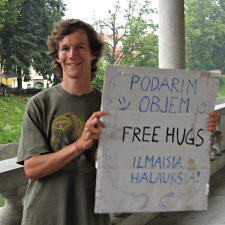 After hiking in Triglav I stopped in Ljubljana, the capital of Slovenia for five nights. I met other travelers in Metelkova, joined a Free Hugs party and had one of the most extreme CouchSurfing experiences ever.
After hiking in Triglav I stopped in Ljubljana, the capital of Slovenia for five nights. I met other travelers in Metelkova, joined a Free Hugs party and had one of the most extreme CouchSurfing experiences ever.
Ljubljana is nice and small for being a capital. The castle hill overlooks the city center which is crossed by the Ljubljanica river. Many buildings date back several hundred years but the center got its current look during the first half of 20th century, largely from the drawing board of one architect, Joze Plecnik. Stylish cafes populate the riverside which also has plenty of spots where street artists play music and show their skills every day. Only about a kilometer away there's Metelkova, a group of buildings squatted 15 years ago with funky art galleries, graffiti all over the walls and people hanging out drinking beer every night.
I had already walked the usual touristic trail with my mother and brothers two weeks earlier so this time I spent more time meeting people in Metelkova. I cooked with a group of Finns who were traveling from a festival to festival in an old campervan and listened to music with two French guys from Lyon. And in Metelkova I also met Andrej.
Andrej was the most active CouchSurfing member in Ljubljana and didn't have any guests at the moment so he readily invited me to his house. I was staying in a hostel but moved the next day. One day later an American guy and two Canadians arrived, also bringing in as a surprise four Danish girls who had been in the same bus and didn't have a place to stay. Andrej picked up everybody from the city center in his car and gave a city tour in the evening while still keeping his building maintenance business going at the same time.
Laurent and Gabrielle, the two Canadians got an idea to have a Free Hugs event on Saturday. The idea is simple: make signs which say Free Hugs in English, the local language and possibly other languages, smile and give a hug everyone who is willing to accept one. We met in the city center and started hugging strangers under the covered sidewalk by the market and on Preseren square, in the middle of rain. After two hours everybody was wet and happy.
While giving hugs we also met a group of French students who were looking for a place to set up their tent. They didn't have to: Andrej invited them in to have 12 guests in total and the day ended in a drinking party in his house 8 km from city center.
On Sunday morning everybody went in their own directions. I had planned to hitchhike towards Bosnia, but late Sunday morning apparently wasn't the best time for that. After a couple of hourse of waiting I decided to take a train to Zagreb, Croatia and spend the evening there.

Copyright Arto Teräs <ajt@iki.fi>, licensed under the Creative Commons Attribution-Share Alike 3.0 Unported License. (Unless otherwise mentioned in individual photos or other content.)